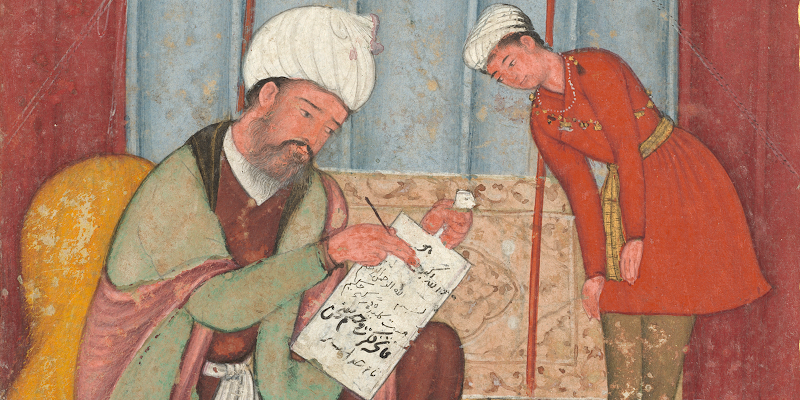Non-Muslims and the Iranian Parliament, 1906-1911
hosted by Chris Gratien
Non-Muslim communities of the Middle East were intimately involved in the rise of constitutional politics that occurred in both the Ottoman Empire and Iran during the early 20th century. But to what extent were their interests represented in the emerging parliaments of revolutionary constitutional governments? In this episode, Saghar Sadeghian discusses her research on the representation of non-Muslim communities of Iran such as Jews, Armenians, Zoroastrians, and Baha'is during the early years of constitutionalism from 1906 to 1911.
STREAMING AUDIO
via Soundcloud (US / preferred)
PARTICIPANT BIOS
 |
Saghar Sadeghian is the Henry Hart Rice Family Foundation Fellow and Lecturer at the MacMillan Center. Her research focuses on the ideas of nationality, constitution, and modern institutions in Iran, Iraq, and Afghanistan during the nineteenth and twentieth centuries. She is specifically interested in minority groups in the Middle East and the question of gender, race, religion and ethnicity.
|
 |
Chris Gratien holds a Ph.D. from Georgetown University's Department of History. His research focuses on the social and environmental history of the Ottoman Empire and the modern Middle East. He is currently preparing a monograph about the environmental history of the Cilicia region from the 1850s until the 1950s. |
CREDITS
Episode No. 236
Release Date: 7 April 2016
Recording Location: Yale University
Editing and production by Chris Gratien
Sound excerpts: Istanbul'dan Ayva Gelir Nar Gelir - Azize Tozem and Sari Recep; Baglamamin Dugumu - Necmiye Ararat and Muzaffer; Seyfettin Sucu - Eğin Türküsü (digitized by Chris Gratien); Harmandali - Recep Efendi, Cemal Efendi
Image via Iran Review
Bibliography courtesy of Saghar Sadeghian
SELECT BIBLIOGRAPHY
Abrahamian, Ervand, Iran Between Two Revolutions, (Princeton University Press, Princeton.1982).
Afary, Janet, The Iranian Constitutional Revolution, 1906-1911, (Colombia University Press, New York, 1996).
Bayat, Mangol, Iran’s First Revolution , Shi’ism and the Constitutional Revolution of 1905-1909, (Oxford University Press, New York, Oxford, 1991).
Berberian, Houri, Armenians and the Iranian Constitutional Revolution of 1905-1911, (Westview Press, the USA and the UK, 2001).
Brookshaw, Dominic Parviz, and Fazel, Sina B., (editors), The Baha’is of Iran, (Routledge, London and New York, 2008).
Chaqueri, Cosroe, The Armenians of Iran: The Paradoxical Role of a Minority in a Dominant Culture, Articles and Documents, (Cambridge, Mass, Distributed for the Center for Middle Eastern Studies of Harvard University by Harvard University Press, 1998).
Der Matossian, Bedross. Shattered Dreams of Revolution: From Liberty to Violence in the Late Ottoman Empire. Stanford, CA: Stanford University Press, 2014.
Golnazarian-Nichanian, Magdalena, Les Arméniens d’Azerbaïdjan, Histoire locale et enjeux régionaux 1828-1918, (Centre d’Histoire Arménienne Contemporaine, Paris, 2009).
Hairi, Abdul-Hadi, Shi’ism and Constitutionalism in Iran. A Study on the Role Played by the Persian Residents of Iraq in Persian Politics, (E.J. Brill, Lieden, 1977).
Momen, Moojan “The Baha'is and the Constitutional Revolution: The Case of Sari, Mazandaran, 1906-1913”, Journal of International Society for Iranian Studies, Vol.41, No.3, (Routledge, UK., 2008), pp.343-363.
Sanasarian, Eliz, Religious Minorities in Iran, (Cambridge University Press, UK, 2000).
Sohrabi, Nader. Revolution and Constitutionalism in the Ottoman Empire and Iran. New York: Cambridge University Press, 2011.
اشراق خاوری، عبدالحمید، "شرح حال مرحوم شیخ الرئیس"، آهنگ بدیع، سال پنجم، شماره های یازدهم تا هجدهم، لجنۀ ملی نشریات امری، تهران، 107-108 بدیع/ 1951-1952 میلادی
امینی، تورج، اسنادی از زرتشتیان معاصر ایران (1338-1258 ش) ، سازمان اسناد ملی ایران پژوهشکدۀ اسناد، تهران، 1380ش
کرمانی، ناظم الاسلام، تاریخ بیداری ایرانیان، به اهتمام علی اکبر سعیدی سیرجانی، 2 جلد، انتشارات بنیاد فرهنگی ایران با همکاری انتشارات آگاه و انتشارات لوح، تهران، تابستان 1357
خارابی، فاروق، انجمن های عصر مشروطه، انتشارات موسسه تحقیقات و توسعۀ علوم انسانی، تهران، 1386
نائینی، میرزا حسین، تنبیه الامّه و تنزیه الملّه، با مقدمه، تصحیح، ویراستاری، شرح و تعلیق روح الله حسینیان، مرکز اسناد انقلاب اسلامی، تهران، 1386
اشیدری، جهانگیر، یادداشت های کیخسرو شاهرخ، نمایندۀ پیشین مجلس شورای ملی، چاپ پرچم، تهران، 2535 شاهنشاهی، 1355 شمسی
رائین، اسماعیل، انجمن های سرّی در انقلاب مشروطیت، سازمان چاپ و انتشارات جاویدان، تهران، 2535 چاپ دوم
رائین، اسماعیل، یپرم خان سردار، انتشارات موسسه تحقیق رائین، تهران، چاپ دوم، 2535
ترکمان، محمد، مجموعۀ از رسائل، اعلامیه ها، مکتوبات، ... و روزنامۀ شهید شیخ فضل الله نوری، 2 جلد، موسسۀ خدمات فرهنگی، تهران، 1362-1363
یزدانی، مینا، اوضاع اجتماعی ایران در عهد قاجار از خلال اثار مبارکۀ بهائی، موسسۀ معارف بهائی ، آنتاریو، کانادا، 2003 میلادی، 1382 شمسی
لوح مشروح، متن قابل جستجوی مشروح مذاکرات مجالس شورای ملّی و اسلامی، نسخه دوم، کتابخانه موزه مرکز اسناد مجلس شورای اسلامی، مرکز تحقیقات کامپیوتری علوم اسلامی










Comments
Post a Comment
Due to an overwhelming amount of spam, we no longer read comments submitted to the blog.